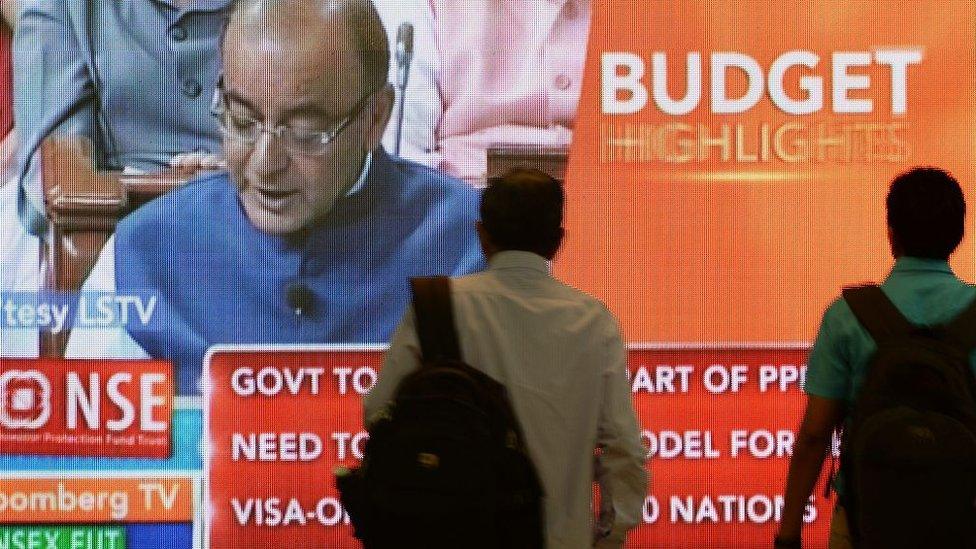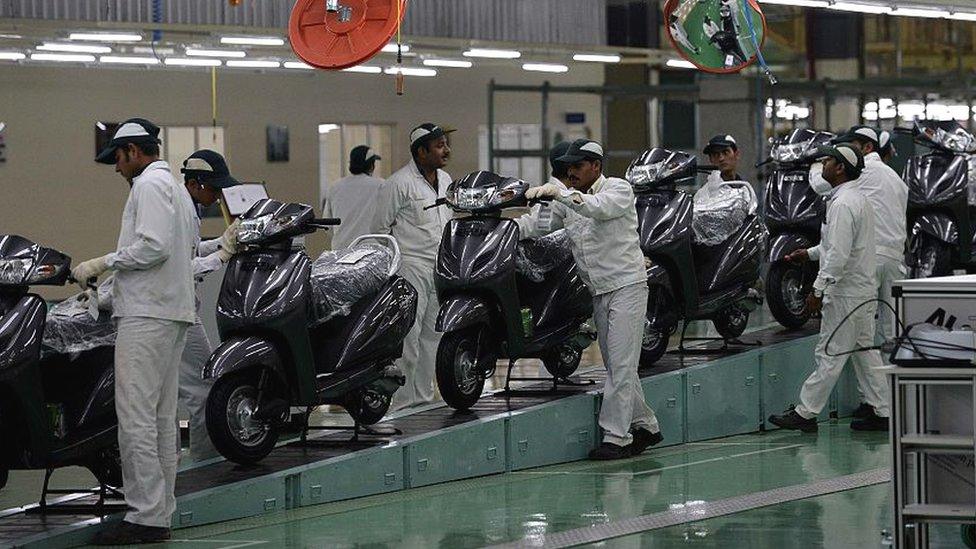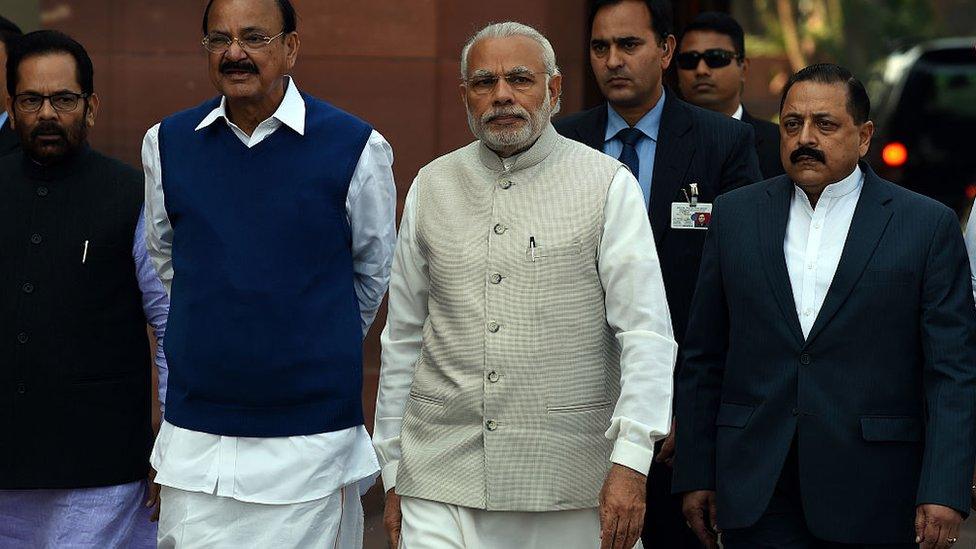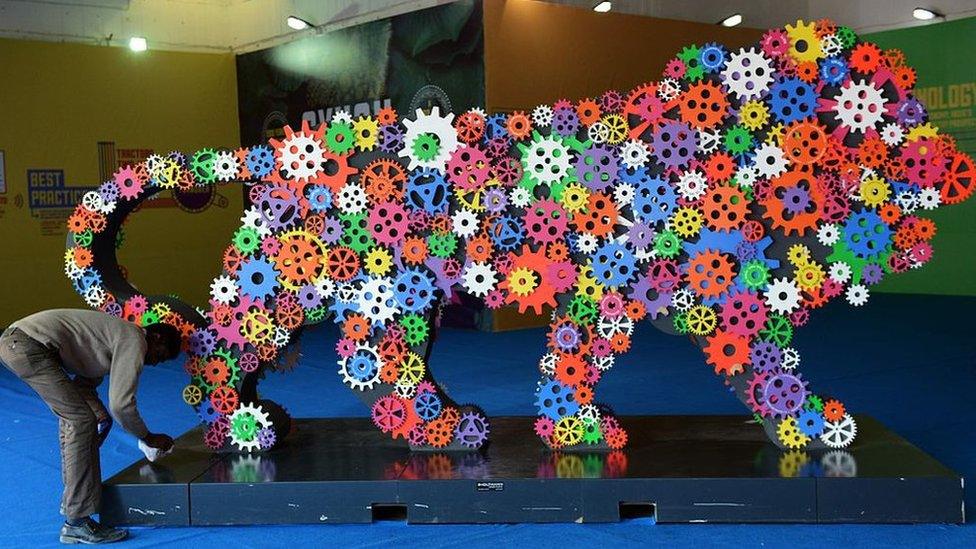Is it getting any easier to do business in India?
- Published

Finance Minister Arun Jaitley delivering last year's budget: Indians are waiting to see what business reforms this year's budget will bring
It didn't take Satya Vadlamani long to get a taste of India's bureaucracy.
Whether it was acquiring land, licences to build her pharmaceutical factory or getting access to finance, she says it was one hurdle after another.
That was in 2004. Today the business is thriving, employing more than 100 people at the Murli Krishna Pharma plant in western Maharashtra.
But despite the Indian government's promises to make the country an easier place to do business, Mrs Vadlamani says there's still a long way to go.
"I am yet to see any change on the ground for small and medium sized businesses like ours to say that it has got easier to do business in India," she says during a panel discussion for the BBC World News TV programme Talking Business.
And Mrs Vadlamani, who only managed to get her initial bank loan after an industrialist friend agreed to act as guarantor, says finance is one of the biggest problems.
"India's banking laws are still not good for business; banks should be able to give longer moratorium to entrepreneurs.
"That is not happening, as when businesses apply for loans, they have to show how fast they can start making profits.

Workers at Honda's fourth factory in India: Despite its economic growth India's reputation for red tape remains
"Factories and businesses need some time to start making money, and banks should be able to understand that."
Slow progress
Posters at Mumbai's airport boast that the country climbed 12 places in the World Bank's ease of doing business index in 2015. What those adverts do not mention is that it still ranks only 130th in the world.
And India's reputation for red tape remains.
Setting up a business here takes on average 29 days, according to the World Bank. Unethical practices, delays in approvals, high financing costs, taxes, and the availability of skilled labour pose major obstacles in the operation and growth of business in India.
And then there's the country's fragmented system of state government, with each state having its own rules and regulations.

Businesses want to see India's government bring in a simplified tax structure
While most people agree that a lot of these barriers could be swept aside with a new goods and services tax - making taxation more unified and less complex - successive governments have dragged their heels on making this long-held ambition a reality.
That's something firms like the drinks giant Diageo wants to see - as it tries to do business in a nation renowned for its love of whisky.
Abanti Sankaranarayanan, business head of Diageo subsidiary United Spirits, says that because the 29 states and seven union territories all have their own rules on alcohol - from tax to labelling - it makes being an efficient business extremely difficult.
And she argues her industry is a great example of where it definitely is not easy to do business.
Tax reform
The one solution for this excessive regulation would be the passing of the goods and services tax bill, she says.
"We are really hoping the goods and services tax bill gets passed in the upper house of parliament with alcohol included in the amendment bill.
"'This is very important for this industry as this is the once in a lifetime opportunity for the government and this industry to get progressive and get rid of the plethora of different taxation.
"This will make a big impact on issues with corruption because of excessive regulation."
Admitting to the complex business environment in India, Amitabh Kant, the mastermind behind India's Make in India campaign and the secretary of the government's department of industrial policy and promotion, says that "a lot of the dismantling of unnecessary rules, regulations and procedures has started.

The 'Make In India' logo on display at last November's international trade fair in New Delhi
"The government is very determined to make India one of the easiest places to do business in, and all of that is work in progress."
Budget hopes
The hope is that the construction of industrial corridors between major cities like Delhi to Mumbai, Chennai to Bangalore, and Chennai to Vishakhapatnam will drastically bring down logistics costs for manufacturing companies.
Despite the high costs, many think this may be the best time to be in India because it is one of the fastest-growing large economies in the world.
How the government will capitalise on this is something to watch on Monday, when India's Finance Minister Arun Jaitley unveils the annual budget.
Business leaders in India and investors abroad will be listening carefully for any announcements that can help simplify business processes in India.
For more on doing business in India and the economic reforms that are needed, check out this week's episode of Talking Business. The programme is broadcast on the BBC News Channel on Saturday 27 February at 20:30 GMT, and on BBC World at 00:30 GMT and on Sunday 28 February at 12:30 and 18:30 GMT
- Published26 February 2016
- Published22 February 2016